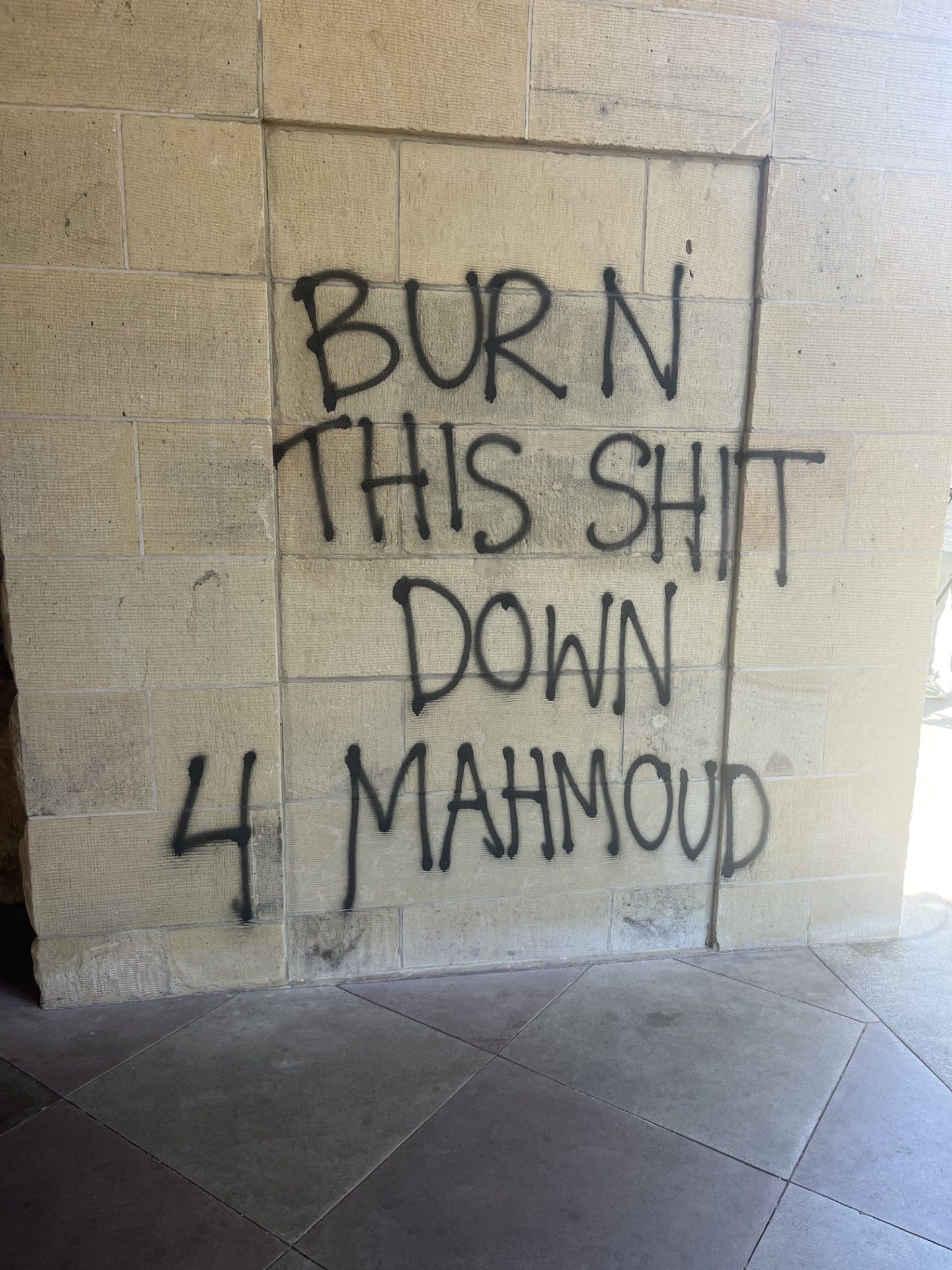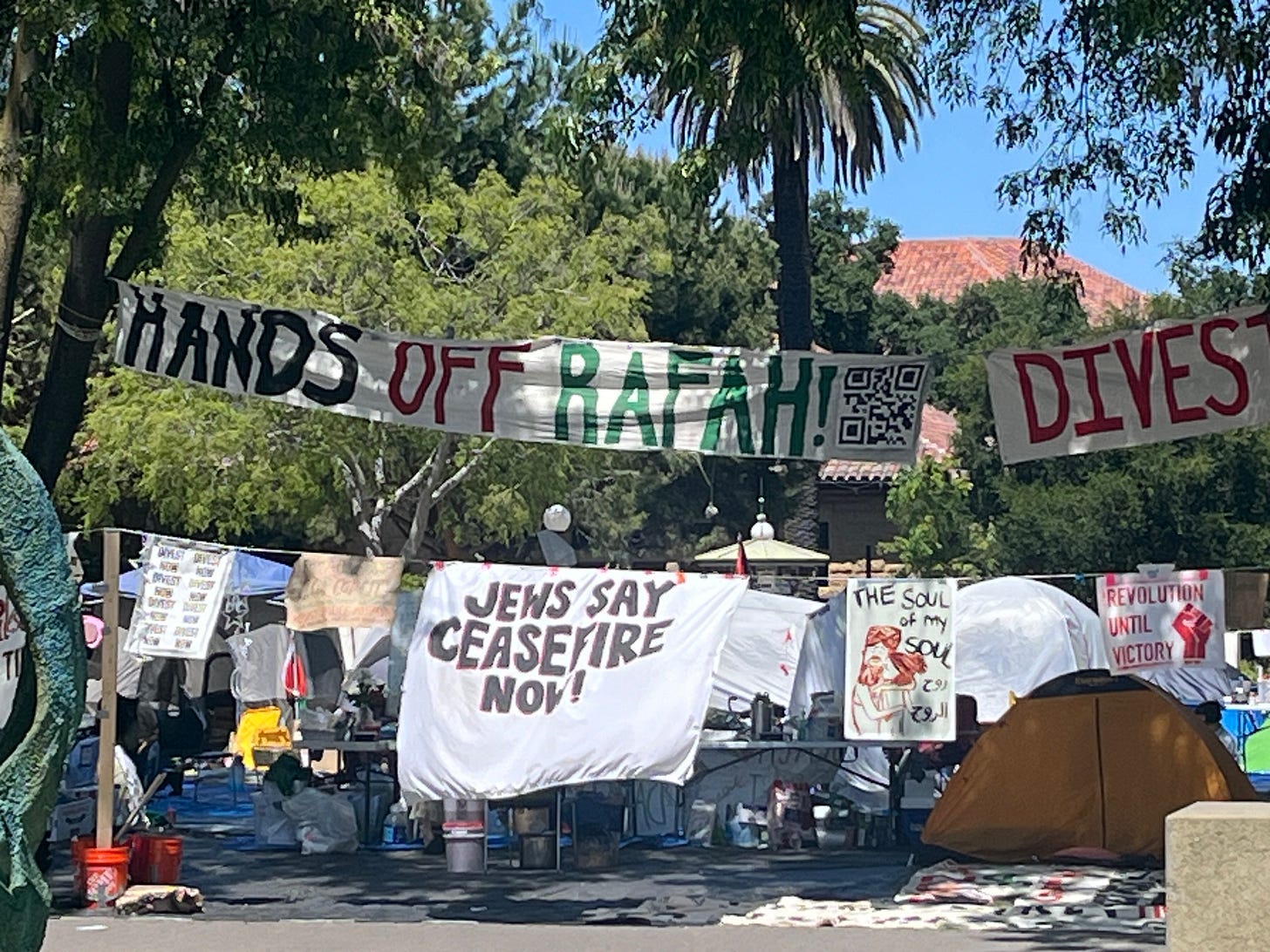Diary of a Professor Working and Living on a College Campus Right Now
We need more opportunities for learning, dialogue, and discussion about the Middle East
Given recent events on our campus, I have to update this essay. I was wrong. Or I wrote too soon. Mea Culpa.
Last week, a group of students occupied our president’s office. Some of them also spray painted vulgar graffiti on the walls of our Quad, the oldest part of campus, including on a memorial to veterans. I am shocked and appalled. I supported peaceful protestors, even though I disagreed with some of their messages, But I do not support vandalism. I do not support this occupation stunt. It achieved nothing. The students who carried out these idiotic acts are of course a tiny fraction of our student population. But still. I am disappointed that even a single Stanford student would participate in these actions. Some of the phrases spray painted were especially vile — so vile that I am not posting them here.
On Sunday, we will hold our graduation ceremonies. I hope that students who want to signal their displeasure with our university officials will do so in a manner that will not interrupt this ceremony for everyone else. When I graduated from Stanford many moons ago, I was very involved in the anti-apartheid movement. At graduation, we asked those activists against apartheid and seeking divestment not to disrupt the ceremony, but instead wear a red sash. It was a good compromise. If there will be protests on Sunday I hope those protesting will consider a similar way to express their views, but without participating in acts of disruption, vandalism or illegal break and entering again.
The original essay:
Every day, I read about protests, arrests, vandalism, antisemitism, islamophobia, conflict, and violence on college campuses across the United States. I have no basis to dispute any of this reporting. Some of it – antisemitic slurs and violent arrests of peaceful pro-Palestinian protestors, including some professors – are deeply disturbing to me. We have many of these challenges here at Stanford University too, where I work and live. I have taught at Stanford for 30 years, lived on campus for 20 years, and have never before seen our community in such turmoil.
At the same time, a lot is happening on our campus that does not get reported. So, in this essay, I want to share some anecdotes from my own life at Stanford over the last two weeks. I do not intend to make any generalizations about campus life. My personal story is n=1 to put it into our social science jargon. And obviously, I am a professor, not a student. These snippets of life on campus are from my personal experience and just some facts that those not living on our campus may not know.
I ride my bike to work every day. It is an 8-minute commute downhill to my office and maybe a 15-minute ride back home, up the hill. Twice a day, I pass by the encampment of students living on the White Plaza in the center of our campus in protest of the Israeli-Hamas war and other things. Months ago, we had two encampments – one pro-Israel and one pro-Palestine – and the university decided to disband them. As of two weeks ago, a new pro-Palestinian one has popped up. No one at this encampment (or from the previous ones) has ever interfered with my commute. I often slow down to see what is happening: I mostly see peaceful protestors but at times, also stop to watch students engage in conversation and sometimes arguments. Since October, I have not once seen anything violent between the two groups. Also, on my way to and from work, I pass by one dorm that flies a Palestinian flag and another with an Israeli flag.
I have attended several events related to this war in the last few weeks. I was in the audience for our annual Daniel Pearl Memorial Lecture, cosponsored by our Israeli Studies Program, that Yossi Klein Halevi from Israel delivered at the Freeman Spogli Institute (FSI) that I direct. You can watch it here. A week later, I listened to Salam Fayyad, former Prime Minister of the Palestinian Authority, speak at FSI. You can watch a recording here. Our Arab Reform and Democracy Program sponsored that event and many others since the October 7th terrorist attacks in Israel. The next day, Dr. Fayyad shared the stage with Alon Tal, a former Member of the Knesset (Israel’s Parliament) who is now a visiting scholar in our Israeli Studies program. This conversation was part of a new series at Stanford called Democracy and Disagreement. Hundreds of people attended these three events. These conversations and questions raised were intense but polite. They dealt with tough issues like the definition of genocide, war crimes, the two-state solution, and whether Hamas can be part of any future negotiations. But no one screamed. No one was arrested. And no protestors tried to disrupt any of these events.


One of Stanford’s star faculty members, Larry Diamond, played a key role in helping educate our students about the Middle East over the last seven months and organizing and moderating all these events over the last two weeks. Yes, some teaching staff have contributed to the polarizing climate by their statements in and outside the classroom. But Professor Diamond is part of our Stanford community too. He has nothing but exemplified how to organize difficult discussions. You do not have to agree with all his positions to respect what he is doing to encourage learning and dialogue. That is happening on our campus too.
Last week, I also hosted a dinner with two dozen students at which the ongoing situation in Gaza was respectfully discussed at length. During office hours, I met one-on-one with students who had strong views on the war in Gaza, including one – a Muslim from the region – who criticized what Hamas was doing, and another – a supporter of Israel – who criticized what Prime Minister Netanyahu was doing. In the last two weeks, I also met with an academic friend visiting from Israel and another academic friend visiting from Morocco. Both conversations were intense but civil.
All these events happened in my life in just the last two weeks. Such weeks are normal for me here at Stanford. I appreciate my privilege of being connected to incredible scholars, students, and visitors with expertise in the Middle East. But these a normal, everyday events happening on our campus too.
Again, I am in no way suggesting that these anecdotes add up to a general description of life on campus. Nor am I suggesting that they somehow offset or excuse other horrible things that have happened on our campus. For instance, the Anti-Defamation League (ADL) gives Stanford an F for its efforts to address antisemitism. (Read more here: https://www.adl.org/campus-antisemitism-report-card/stanford-university) That’s disturbing. A few months ago, students with a pro-Palestinian position were arrested for interrupting an event. I am not a member of the Subcommittee on Antisemitism and Anti-Israeli Bias, so I don’t know all the facts about many other troubling instances on campus.
But for those of you not living on our campus, I want you to know that it is not a war zone; there has been no physical violence that I know of; and for every person shouting antisemitic or Islamophobic slurs, there are hundreds more students not doing so. In fact, many students are trying to learn more about the Middle East and do so earnestly constructively. Some, such as the students in our Master’s in International Policy program have self-organized speaker series on the conflict. As educators, our mission should be to provide more opportunities for learning and discussion, bring more speakers from the Middle East, and hire more professors with expertise on Israel and the Arab world. There is a big demand for more and better opportunities to learn about the region. I witnessed it in just the last two weeks.




Thank you. I’ve been extremely concerned about what’s happening on campuses and your article is so helpful. I’m a Jewish woman. Never in my life did I think the cautionary words of my father be true, that concern about antisemitism would once again become ignited as it is. (He fought in wwii and his and my moms parents all came from the general Ukraine areas) Still so worried the wrong messages will take hold beyond the universities and extremely pleased to hear about the intense and civil discussions, the best outcome of the moment. Education is the key to peace for everyone. Here’s hoping.🕊️
Thank you for a very illuminating piece, one that highlights the necessity and benefit of open dialogue and civil respect all around, even under duress. If our Universities lose their grounding in dialogue to rage, political dysfunction and interference, it will be a very bad day for all of us, both now and down the road.